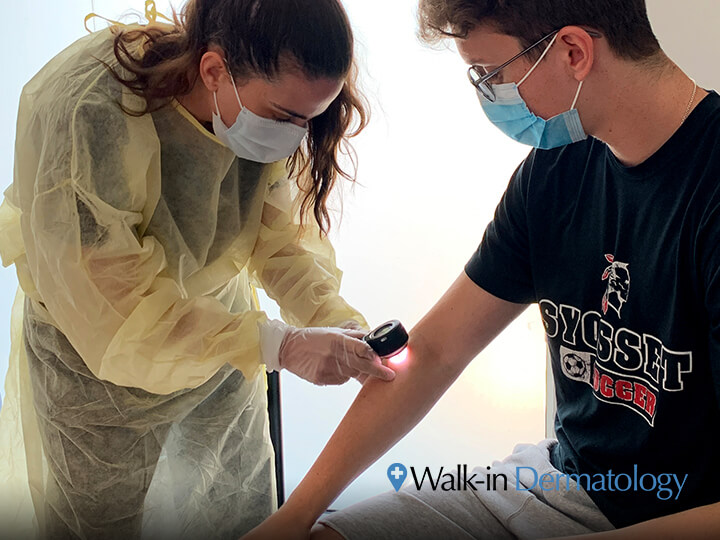Phenomenal Chromaderm Dermatologist Solutions Now Available in Doncaster
Phenomenal Chromaderm Dermatologist Solutions Now Available in Doncaster
Blog Article
Exploring the Duty of Skin Specialists in Diagnosing and Treating Varied Skin Problem With Accuracy
The area of dermatology plays a crucial function in determining and taking care of a huge range of skin disease that individuals may come across. From common issues like acne and dermatitis to extra intricate conditions such as melanoma or rare hereditary skin diseases, skin doctors go to the center of identifying and treating these problems with accuracy. With advancements in diagnostic tools and customized treatment techniques, skin doctors are increasingly able to customize treatments to individual clients' requirements - Chromaderm Dermatologist. Beyond the surface of skin problems exist interconnected variables that affect medical diagnosis and therapy outcomes. Understanding the intricate internet of hereditary, ecological, and lifestyle aspects that add to skin wellness is vital for comprehensive care.
Importance of Early Discovery
Very early discovery of skin conditions plays a crucial function in the efficient treatment and administration by dermatologists. Timely recognition of skin problems permits prompt intervention, which can stop the progression of conditions and decrease prospective problems. Dermatologists rely upon their experience to identify refined adjustments in the skin that might indicate underlying issues, such as skin cancer, dermatitis, eczema, or psoriasis. By carrying out thorough exams and making use of diagnostic tools like biopsies or dermoscopy, skin doctors can precisely detect a variety of skin problem.
Identifying skin cancer cells in its early phases dramatically enhances the diagnosis and boosts the possibility of effective treatment end results. Highlighting the value of early discovery underscores the critical duty that dermatologists play in promoting skin health and wellness and wellness.
Advanced Diagnostic Techniques
Utilizing modern technology and specific competence, skin doctors employ innovative diagnostic strategies to accurately identify and evaluate various skin disease. Among the key devices in the dermatologist's diagnostic collection is dermoscopy, a non-invasive strategy that enables for the assessment of skin structures not visible to the naked eye. By magnifying the skin, dermoscopy help in the early detection of melanoma, basic cell cancer, and other skin cancers. Furthermore, dermatologists might make use of confocal microscopy, a high-resolution imaging method that enables them to picture skin at a cellular degree without the requirement for a biopsy. This technology is especially practical in detecting inflammatory skin problem and surveillance therapy efficiency.
Moreover, molecular screening has actually changed the diagnosis and treatment of skin illness by enabling dermatologists to evaluate genetic mutations associated with problems such as melanoma and hereditary dermatoses. Through techniques like polymerase domino effect (PCR) and next-generation sequencing (NGS), skin doctors can offer tailored therapy strategies based upon a person's certain hereditary profile. These sophisticated diagnostic devices enhance the precision and efficiency of skin-related treatment, eventually resulting in better end results for clients.

Tailored Treatment Techniques
With a thorough understanding of skin disease achieved through advanced analysis methods, dermatologists customize therapy techniques to deal with private client needs successfully. This personalized method is crucial in guaranteeing ideal results for people with diverse skin conditions. By taking into consideration elements such as skin type, case history, way of life habits, and treatment preferences, dermatologists can develop treatment strategies that are particularly tailored per individual.
Tailored treatment strategies may include a combination of therapies such as topical medications, oral medications, minimally intrusive procedures, or lifestyle adjustments. For example, people with acne may benefit from a regimen that includes topical retinoids, oral antibiotics, and in-office treatments such as chemical peels or laser treatment. On the various other hand, people with dermatitis may need a treatment plan concentrated on mild skincare regimens, creams, topical corticosteroids, and identifying and avoiding triggers that worsen their problem.

Handling Persistent Skin Disease
Dermatologists play an essential role in creating long-lasting administration strategies for chronic skin problems, making sure effective treatment and boosted lifestyle for patients - Chromadermatology. Managing chronic skin conditions needs a comprehensive technique that exceeds simply dealing with signs and symptoms. Dermatologists are trained to not just identify these problems precisely however also to produce customized therapy strategies that deal with the underlying variables and causes adding to the skin problem's persistence
In taking care of persistent skin disease, skin doctors usually employ a mix of therapy techniques tailored per person's particular requirements. This might include topical drugs, oral medications, lifestyle adjustments, and step-by-step treatments such as laser therapy or photo-therapy. Regular follow-up consultations are important to keep track of the problem's development, change treatment as required, and supply recurring assistance and Recommended Site education to patients.
Furthermore, skin specialists play a crucial role in empowering individuals to take an active function in managing their skin condition. By enlightening individuals about their condition, therapy choices, and preventive actions, dermatologists help individuals make notified choices and grow healthy and balanced skin routines that add to long-lasting skin wellness and general wellness.
Collaborative Care Strategies
In the holistic management of skin problem, collaborative treatment strategies entailing different health care professionals are essential for optimizing individual end results. Dermatologists usually function in multidisciplinary groups to supply comprehensive treatment that deals with the varied requirements of individuals with skin problem. By working together with health care physicians, specialists, plastic doctors, and other professionals, skin specialists can make certain that individuals receive incorporated and collaborated care tailored to their certain problem.
Collective treatment techniques also reach person education and assistance. Skin doctors can function very closely with psycho therapists, pharmacists, and nurses to educate clients about their skin problem, treatment alternatives, and safety nets. This interdisciplinary method equips patients to proactively join their care and make notified choices concerning their health.
In addition, collective treatment permits for a more all natural evaluation of patients, taking right into account not only the physical signs of their skin problem but likewise the social and emotional influence it might have. By taking into consideration the more comprehensive implications of skin disease, healthcare experts can create much more tailored therapy strategies that resolve the special demands of each client. Inevitably, collaborative treatment methods play a critical function in delivering top quality, patient-centered look after people with varied skin conditions.
Conclusion
Finally, dermatologists play a crucial role in identifying and treating a broad variety of skin conditions with accuracy. With very early discovery and progressed diagnostic techniques, they are able to offer tailored treatment techniques for optimum end results. By handling chronic skin disease and implementing collaborative care methods, dermatologists ensure thorough and effective treatment for their clients. Their knowledge and commitment contribute dramatically to the general wellness and wellness of individuals with diverse skin problems.
Dermatologists depend on their experience to recognize refined changes in the skin that may show underlying problems, such as skin cancer cells, psoriasis, eczema, or dermatitis. By magnifying the skin, dermoscopy help in the very early detection of cancer malignancy, basic cell carcinoma, and various other skin cancers cells.With an extensive understanding of skin conditions accomplished with sophisticated diagnostic methods, skin specialists tailor treatment strategies to resolve individual person needs effectively. Skin doctors are trained to not only detect these problems precisely but likewise to create customized treatment strategies that deal with the underlying variables this content and causes contributing to the skin condition's perseverance.
In managing chronic skin conditions, dermatologists commonly use a mix of treatment techniques tailored to each person's specific here needs.
Report this page